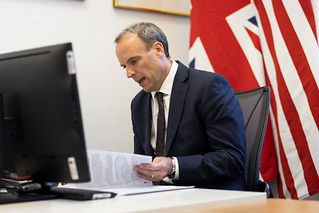The Group of 7, or G7, met this week to speak about the unfolding situation in Afghanistan and reaffirmed the commitment to respecting human rights of all, including women, children and minorities, according to media reports citing statements from British Secretary of State Dominic Raab.
The diplomatic grouping also highlighted the “urgent need for the cessation of violence” in Afghanistan, which has been taken over by the Taliban last after dethroning then-President Ashraf Ghani.
The foreign secretary of the United Kingdom further said that the G7 has also urged the Talibani forces to protect civilians as reports about growing violence emerge from Afghanistan, according to reports from BBC.
G7 ministers said they would “engage with partners” in order to attain an “inclusive political settlement” to make sure that humanitarian aid reaches the people in Afghanistan on time and in the right amount.
The diplomatic grouping also came to the conclusion that an international response would be needed to get the situation in Afghanistan under control. According to reports from ANI citing the meeting outcomes, the response should come from parties like the United Nations Security Council, international donors, the G20 and regional neighbours of the country.
The meeting, which was conducted on Thursday, was chaired by the British foreign secretary. Among the attendees were foreign and development ministers from Japan, Italy, France, Canada, Germany, United States and representatives from the European Union.
The news comes the Taliban celebrated Afghanistan‘s Independence Day on Thursday by declaring it had beaten “the arrogant of power of the world” in the United States.
The Taliban are under pressure to come up with a plan for the kind of government they want to lead. So far, they’ve only said that their government will be guided by Shariah, or Islamic, law.
Earlier on Thursday, Raab wrote on Twitter, “Discussed Afghanistan with Chinese Foreign Minister Wang Yi today. We noted the importance of addressing security concerns, regional stability and addressing the humanitarian crisis.”







